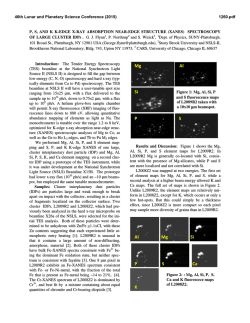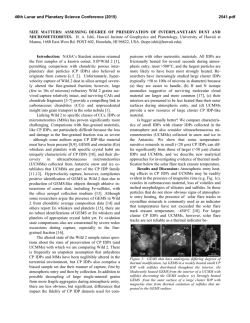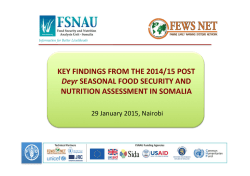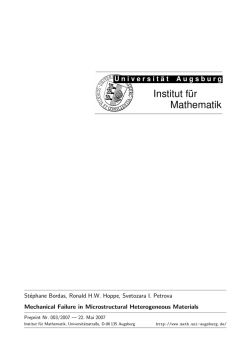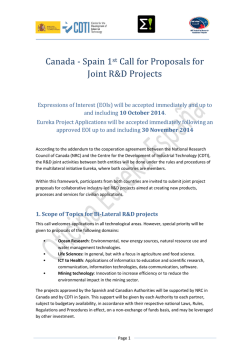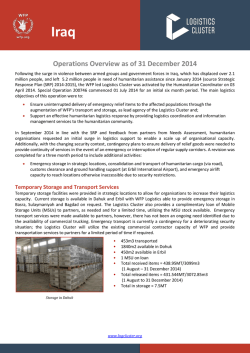
Quarterly Update - The Internal Displacement Monitoring Centre
Quarterly Update October - December 2014 This Quarterly Update covers the activities of the Geneva-based Internal Displacement Monitoring Centre (IDMC) between 1 October and 31 December 2014. It is also available to be read online or downloaded at www.internal-displacement.org. IDMC, established by the Norwegian Refugee Council, is the leading non-governmental body monitoring internal displacement worldwide. IDPs high on the agenda UN climate change conference in Lima IDMC participated at the UN climate change conference in Lima in December, we promoted joint messages and knowledge on displacement, migration and planned relocation with parties, observers and other participants. A joint exhibit on the same theme was held at the margins of the conference. IDMC took part in this Conference as a member of the Advisory Group on Climate Change and Human Mobility, along with its parent organisation, the Norwegian Refugee Council (NRC), the UN Refugee Agency (UNHCR), the International Organisation for Migration (IOM), the United Nations University (UNU)’s institute for the environment and human security (UNU-EHS), the UN Development Programme (UNDP), the International Labour Organisation (ILO), Sciences Po’s centre for studies in international relations (CERI) and Refugees International. Other engagements at the conference also included: • Participation in the eighth focal point meeting of the UN Framework Convention on Climate Change (UNFCCC)’s Nairobi work programme on impacts of climate change as well as the issues of vulnerability and adaptation during the 41st session of the Subsidiary Body for Scientific and Technological Advice (SBSTA). Our contributions were acknowledged in the synthesis report from the session (UN FCCC/SBSTA/2014/4, ref. B2:13, and C2:29 and 30). • IDMC moderated a side-event hosted at the EU pavilion that explored the links between displacement and other forms of human mobility, as well as between food security and nutrition in the context of the climate talks. Speakers from CARE Peru, France’s Institute of Research for Development (l’Institut de Recherche pour le Developpement, IRD), IOM, UNU, Action Against Hunger (Action Contre la Faim, ACF), the University of California and the International Union for Nutritional Sciences (IUNS) took part. • We presented the findings of our research on displacement related to disasters at a press conference on climate change and human mobility organised by UNHCR. The event was broadcast live on the UNFCCC website and the findings were picked up by the Brazilian press. • IDMC sat on the panel at a side event convened by NRC and the Norwegian government and attended by more than 50 people. Here again, we presented our evidence on the scale, scope and patterns of displacement associated with IDMC joined the Lima UN Climate Change Conference to share insights on the links between climate change and human mobility. (UNFCCC, December 2014) weather-related hazards, and the risk of future displacement. The panel also included ministers from Norway, Switzerland and Costa Rica, and the special envoy of the Nansen Initiative chairmanship. Data collection In December IDMC participated in consultations and a workshop of the Humanitarian Caseloads Consultations on the improvement in the gathering of information on internal displacement. This is part of a process led by the global Information Management Working Group, initiated by the Inter-Agency Standing Committee (IASC), in an effort to make the collection of humanitarian data more consistent. Protracted displacement IDMC contributed two case studies and a summary on the livelihoods of people living in protracted displacement in Sudan and Colombia. This research is part of a project with the Overseas Development Institute (ODI). The report, which looks at humanitarian and development initiatives that support self-reliance, is due for publication early 2015. Global humanitarian policy forum At the global humanitarian policy forum run by the UN Office for the Coordination of Humanitarian Affairs (OCHA) in December, IDMC sat on the panel of a session on collecting data on people displaced in urban areas. IDMC was also one of the keynote speakers at the launch of the World Humanitarian Data and Trends 2014 report, an event streamed live on UN Web TV. The main message of both presentations was that analysis of displacement to and within urban areas through the lens of the “modelling system” leads to better identification of the factors driving the phenomenon, improved data collection and ultimately a more robust response (see figure below). Causal diagram on displacement related to gang violence in Central America Diagram © Disasters and climate change Global Estimates report Following its launch on the margins of the UN General Assembly in New York in September, IDMC presented the Global Estimates report on people displaced by disasters at a lunchtime event at the International Conference Centre in Geneva on 1 October. Around 80 participants from permanent missions, international organisations and partners attended. South-east Asia technical paper In October, we published a technical paper on the risk of displacement related to disasters in south-east Asia and China at the Nansen Initiative’s regional consultation in Manila. We presented the main findings of the study to more than 120 government specialists in disaster risk reduction, climate change adaptation and the protection of internally displaced people (IDPs) and refugees, as well as researchers and media and civil society representatives. IDMC staff spoke on two panels. During the opening session, we presented evidence on the scale, scope and patterns of past displacement and future risk in the region; and during the closing session, we highlighted the interventions needed to reduce the risk of future displacement related to disasters and climate change impacts. Housing, land and property Workshop on housing practices in urban displacement settings On 16 and 17 October, IDMC and the Massachusetts Institute of Technology (MIT)’s displacement research action network (DRAN) organised a consultative workshop in Geneva to review a set of case studies prepared for the report on housing policies and practices that support durable solutions for urban IDPs. Fifteen participants took part, both members of report’s advisory committee - UNHCR, UNDP, the UN Human Settlements Programme (UN-Habitat), the Office of the High Commissioner for Human Rights (OHCHR), IOM, NRC and the Housing and Land Rights Network - and other experts on urban displacement. The two-day event aimed to gather feedback on the orientation and content of the research so far, and to ensure that the perspectives of both humanitarian or development sectors are reflected in the final report. This research project aims at identifying and examining ways to address challenges in terms of tenure security and adequate housing for urban IDPs. It aims to support the achievement of durable solutions by making a range of options available to policymakers and practitioners to guide them in designing, funding and implementing urban housing policies and programmes. The project has the support of the Special Rapporteur on IDPs’ rights, Chaloka Beyani, and precedes recommendations made in his latest report on durable solutions that highlight the need for a comparative study of good housing practices in urban displacement situations. South and south-east Asia Sri Lanka Following IDMC’s engagement with Human Rights Council members in March 2014, which led to the inclusion of a call for durable solutions for IDPs in the Council’s resolution on Sri Lanka, we have continued to advocate for a better state response to the needs of up to 90,000 IDPs and tens of thousands of returnees. Around 23,000 IDPs are still unable to return because their home areas have been occupied by the military or are in deemed special economic zones, and the state continues to acquire IDPs’ land for questionable public projects. 2 In October, IDMC provided a written submission and oral statement at the 112th session of the Human Rights Committee (HRC). IDMC outlined the challenges inherent in assessing the number and situation of the country’s IDPs comprehensively, given five years of government opposition to such efforts and its inaction since the March resolution. The committee used our analysis to formulate questions for the Sri Lankan delegation, and its concluding observations called on the government to improve its measures to address IDPs’ needs, provide them with voluntary settlement choices and return land occupied by the military to its rightful owners and residents. It also emphasised the provision of sustainable housing, the facilitation of local integration and the creation of livelihood opportunities, with a particular focus on women. Philippines Fighting between Muslim rebels and the country’s armed forces in September 2013 displaced around 120,000 people from the city of Zamboanga on the southern island of Mindanao. Most of the IDPs were able to return in the following months, but a year later 38,000 people are still living in displacement, either in camps or with host communities. In October 2014, IDMC and the Philippines Commission on Human Rights co-organised an advocacy session with the aim of securing durable solutions for all IDPs in Zamboanga. This was followed by a three-day workshop on the issue in Zamboanga. The event brought together 40 representatives from local government, NGOs, international agencies and members of displaced communities, and led to the formulation of 12 key recommendations that informed the Humanitarian Country Team’s drafting of a durable solutions strategy for Zamboanga. The strategy provides a basis for continued international involvement beyond 2014. Papua New Guinea IDMC undertook new research in Papua New Guinea (PNG) that brought the relatively unknown situation of IDPs in the country to light and called for an improved state response. In December, we published our first country overview on PNG, following a mission in October. We found that at least 22,500 people were displaced as a result of conflict and disasters brought on by natural hazards. Nearly all are living in protracted displacement, having fled their homes between four and ten years ago, and their pursuit of durable solutions is hampered by a lack of funding, capacity and political will. The overview identified gaps in the government’s response such as poor disaster monitoring and data collection, and the absence of both an institutional focal point for IDPs and a policy or regulatory framework upholding their rights. A blog post, also published in December, featured the situation of 15,000 IDPs in the Manam area who were displaced from their island by a volcanic eruption in 2004. Europe, the Caucasus and central Asia OSCE human dimension implementation meeting In October, IDMC organised a side event at the Organisation for Security and Cooperation in Europe (OSCE)’s annual human dimension implementation meeting, which was held in Warsaw. The event was entitled “Protection of Internally Displaced Persons in the OSCE region: Applying Lessons Learned to Ukraine”; the panellists included UNHCR; KrymSOS, a Ukrainian NGO assisting IDPs, and IDMC’s senior regional analyst covering Ukraine. IDMC’s director moderated the event, which attracted around 30 participants including representatives from the permanent missions of US, Slovakia and the Netherlands, OSCE field offices and members of civil society in Ukraine and South Africa. Discussions covered the current situation in Ukraine and provided examples of how similar displacement issues had been successfully addressed elsewhere in the OSCE region. The UNHCR/OSCE checklist for the protection of IDPs and affected communities was cited as a useful tool for missions to monitor and report on displacement throughout a conflict, as has been done in Ukraine. EU accession The European Commission’s annual progress reports for candidate countries assess the progress made over the previous 12 months in meeting EU accession criteria. The reports issued for Serbia and Bosnia and Herzegovina in October included issues raised in IDMC’s submissions to the commission’s Directorate General for Enlargement in May and August. In the case of Serbia, the issues included IDPs’ inadequate housing and their unemployment situation; discrimination against Roma IDPs in accessing social protection, health, employment and adequate housing; failure to comply with international standards on forced evictions and relocations; and failure to implement the country’s law on permanent and temporary residence. For Bosnia and Herzegovina, issues included the country’s “two schools under one roof” policy; returnees’ access to social rights; property repossession claims; discrimination against Roma people, particularly in the wake of flooding in May 2014; the continued existence of collective centres and their deplorable living conditions; the need to harmonise social policies across government entities; and the need to step up efforts to prosecute cases of sexual violence during the 1992 to 1995 war. Bosnia and Herzegovina’s human rights record was also scrutinised by the UN’s Universal Periodic Review in November. We submitted a supplementary statement in October to complement the one we made in March, and peer states made 14 recommendations in line with our proposals. We made one submission on Serbia and an original and supplementary submission on Bosnia and Herzegovina. Both countries are expected to implement the commission’s recommendations on the issues they contain as part of their accession processes. Ukraine IDMC published a briefing paper on Ukraine in October that highlighted the growing number of IDPs in the country and explained the obstacles to determining accurate figures. It also outlined IDPs’ numerous protection concerns, including restrictions on freedom of movement, inadequate housing, limited access to social benefits, unemployment and lack of documentation on how to access services. The paper also covered the situation of Roma IDPs, who lack documentation and information about their rights, and face discrimination in exercising them. It commended civil society groups for spearheading the response to displacement, and called 3 on authorities to fulfil their responsibility to address the phenomenon, given the recent adoption of a law to protect IDPs which the president signed in November. A fuller version of our findings will be presented as a case study in our upcoming report on housing policies and practices that support durable solutions for urban IDPs. Bosnia and Herzegovina Middle East and north Africa In November, we published an overview on Bosnia and Herzegovina, where around 100,400 people remain displaced as a result of the 1992 to 1995 war, surviving on benefits and meagre income earned through informal labour. The majority live in private accommodation where their housing conditions are unknown, but a small percentage still lives in collective centres, which are substandard. Palestine Some continue to face difficulties in repossessing their property in their home areas, some have been unable to and others have chosen not to do so. Those who have returned also struggle with reconstruction. Their efforts to re-establish their lives are hampered further by a lack of employment opportunities and ethnically segregated education. The persistence of an ethnic divide in political discourse and policies encourages IDPs to remain displaced or return to areas where they belong to a majority group. This prevents reconciliation and the achievement of durable solutions. Roma IDPs are particularly marginalised and tend to lack the information they need to access services and exercise their housing and property rights. Some IDPs and returnees, including Roma, were displaced again by floods and landslides in May 2014. Kosovo IDMC visited Kosovo in December in search of additional information on the Roma mahala or neighbourhood, a reconstructed area of the northern city of Mitrovica. Roma people fled the mahala in 1999 when it was burned down in retaliation for their perceived alliance with the Serbs against the Albanians. They lived in lead-contaminated camps for a decade before beginning to return. IDMC continued to advocate with the Israeli government for the protection of Palestinian IDPs in accordance with international law, but Israel’s position to date has been that the International Covenant on Civil and Political Rights (ICCPR) does not apply to the territories it occupies. In October, we attended the UN Human Rights Committee’s review of Israel’s stance on ICCPR. Our submission recalled Israel’s responsibility under the covenant to prevent and respond to displacement in the occupied West Bank and Gaza Strip, and the committee’s concluding observation found that it does indeed apply to the territories. In line with our recommendations, the committee also called on Israel to stop punitive demolitions and to refrain from evictions, discriminatory planning policies and forcible transfer. We also raised awareness among UN agencies and NGOs about the weakness of data on internal displacement in Palestine and the need to agree on a common definition of an IDP. Inconsistencies among stakeholders have prevented the collection of comprehensive data, and with it a holistic response to IDPs’ protection and assistance needs, since the occupation in 1967. We published our latest Palestine overview in October, and presented its findings at a conference on forcible transfer and humanitarian assistance in a coercive environment organised by ACF Jerusalem at the University of Geneva. The aim of the event was to contribute to a more common understanding of what defines an IDP and the legal framework applicable in the occupied territories. Following the presentation, the Palestinian mission approached us for input on a resolution it plans to table at the Human Rights Council’s March 2015 session. Also in October, the UN Department of Political Affairs and the Division for Palestinian Rights (UNDPR) invited us to present the findings of our overview at a high level meeting in New York. Participants included senior officials from the Office of the UN UnderSecretary General. UNDPR then invited us to attend its conference on local government and civil society in Seville in December to share our findings with civil society groups. Central Africa IDMC visited the Roma neighbourhood in Kosovo. (IDMC, December 2014) We found that returnees were satisfied with their living conditions, lead levels in their blood had decreased and they felt safe, but that they lamented a lack of employment opportunities that has led some residents to leave. All of the organisations involved in the return project agreed that it had been largely successful, but its sustainability will require the municipal authorities in Mitrovica to take full responsibility for the settlement. Central African Republic IDMC carried out a mission to the Central African Republic (CAR) from 1 to 17 December, to research on recent displacement dynamics, progress towards the domestication of the Kampala Convention and the methodology behind the authorities’ displacement figures. We met IDPs, national authorities, international and national NGOs and UN agencies, and visited the Don Bosco displacement site and the PK5 enclave in Bangui. 4 Chad In October we published an overview entitled Chad: Regional instability overshadows the fate of remaining IDPs, which highlighted the situation of those whom the government does not recognise and so do not receive assistance. It was promoted on social media and attracted the attention of a number of stakeholders. Democratic Republic of the Congo We continued to work on our study of the impact of multiple displacements on IDPs’ vulnerability and resilience. We supported the research analysis remotely and raised awareness through webinars on the World Humanitarian Summit (WHS) consultations. We also held bilateral meetings with organisations such as the International Committee of the Red Cross (ICRC), UNHCR and Care International to present our work and gather feedback. We are in the process with NRC of drafting the first thematic paper that will draw on the primary results of the study. West Africa Nigeria In September, we conducted a 13-day research mission to Nigeria. We met representatives from 23 organisations based in Abuja and consulted staff from field offices in the north-east of the country. Our findings formed the basis for an overview published in December under the title Nigeria: multiple displacement crises overshadowed by Boko Haram. The overview covered the complex and often overlapping causes of displacement, such as attacks by Islamist Boko Haram militants and inter-communal clashes in the country’s Middle Belt region, and the range of threats faced by people forced to flee. It also highlighted a lack of strategy guiding humanitarian assistance and limited discussion of durable solutions at the national and local level. We launched the overview at a panel event hosted by Chatham House in London, entitled: “Elections, Boko Haram and Security: Assessing and Addressing Nigeria’s Complex Challenges.” We outlined the fact that IDPs may not be able to vote in the February 2015 general election, and the problems national and international agencies face in responding to their growing needs. Attendees included Nigerian government officials, policymakers, business representatives, diplomats, civil society representatives, academics and members of the Nigeria diaspora, and audience questions showed a significant interest in displacement issues. We also worked with NRC’s country office to produce French and English-language briefing notes on the country’s progress towards implementing the Kampala Convention for the joint workshop in Addis Ababa which took place in December. East Africa Kenya In preparation for the Universal Periodic Review’s scrutiny of Kenya in January 2015, IDMC contributed to a submission presented by a civil society coalition during a December pre-session. We also reached out to permanent missions in Geneva on the displacement issues highlighted in the submission, focusing on the need for upto-date and comprehensive data as the basis for a more holistic response to IDPs’ needs. Zimbabwe In December, we published a study on Zimbabwe’s legal framework governing the country’s response to IDPs’ protection needs. The study revealed gaps in the legislation that prevent IDPs from exercising their rights, reviewed the laws relevant to internal displacement and evaluated them against international and regional standards. It also formulated a series of recommendations that were validated during a workshop we ran in Harare in November on IDPs’ protection and assistance and the provisions of the Kampala Convention. The workshop gave us the opportunity to present our findings to participants from national authorities, international agencies, civil society organisations and others working on displacement issues in the country. In collaboration with NRC, we also organised follow-up meetings with UN agencies, international organisations, the Zimbabwe Human Rights Commission, donors and civil society members in a effort to facilitate a coordinated approach to implementing the Kampala Convention. The activities also took into account the phasing out of NRC’s operation in Zimbabwe, which was completed by the end of 2014. See also the Training section. Training Workshop on durable solutions in Zamboanga Location Zamboanga, Philippines Dates 1-3 October 2014 Participants 40, including representatives from local institutions involved in the response to displacement, international humanitarian agencies, national and international NGOs, and a group of IDPs Partners Philippines Human Rights Commission, UNHCR Côte d’Ivoire In line with our support for the UN Framework on Ending Displacement in the Aftermath of Conflict, we continued to provide technical assistance in the formulation of a draft strategy for Côte d’Ivoire, which drew heavily on outputs from our Abidjan workshop on durable solutions in June 2014. In October, IDMC and the Philippines Commission on Human Rights ran a workshop on durable solutions in Zamboanga, on the southern island of Mindanao. UNHCR, which sponsors the commission’s programme on IDPs, supported the initiative. It was preceded by a forum for local, national and international stakeholders, which covered potential challenges to achieving durable solutions and highlighted the fact that the imposition of 5 no-return areas and the disqualification of potential returnees from assistance may be in breach of international standards. The workshop led to the formulation of 12 recommendations that informed the Humanitarian Country Team’s drafting of a durable solutions strategy for Zamboanga. As such, it will hopefully contribute to the city’s IDPs being able to make a safe and dignified return to their places of origin. The event gave participants the opportunity to learn from each other’s experiences, draft implementation strategies and discuss the AU’s role in supporting of member states in their efforts. We also used the occasion to publish a briefing paper entitled The Kampala Convention two years on: time to turn theory into practice, which was widely distributed among those who took part. Workshop on applying the Kampala Convention in Zimbabwe Location Harare, Zimbabwe Dates 18 – 20 November 2014 Participants 25 representatives from government ministries, humanitarian agencies, civil society organisations and displaced communities Partners NRC’s Zimbabwe country office IDMC and NRC held a joint workshop in Harare to support Zimbabwe’s process of domesticating and implementing the Kampala Convention and to prepare for the phasing out of NRC’s operation in the country, which was completed in December. In preparation for the workshop, we carried out an extensive study of the current laws and policies relevant to IDPs’ protection. The initiative had a number of objectives. It aimed to contribute to a common understanding of internal displacement in Zimbabwe and highlight issues and concerns affecting IDPs; increase awareness of the Kampala Convention’s provisions and their relevance to addressing displacement in the country; and report on our study of the existing legal framework and identify steps towards bringing it into line with the convention’s requirements. Participants helped to validate the study’s recommendations, and their contributions informed its final revision before publication. It is hoped the study will help the Zimbabwean authorities in their efforts to domesticate the convention. Workshop on the Kampala Convention and national responsibility to protect IDPs Location African Union headquarters, Addis Ababa, Ethiopia Dates 8-10 December 2014 Participants 35 from ten AU member states: Côte d’Ivoire, DRC, Ethiopia, Kenya, Mali, Nigeria, Somalia, Sudan, Uganda and Zimbabwe; plus representatives from international agencies and NGOs that liaise with the AU Partners The AU Commission’s political affairs department and NRC’s AU liaison office To mark the second anniversary of the Kampala Convention’s entry into force, we ran a 2.5-day training workshop on national responsibility for IDPs’ protection. It aimed to familiarise participants, who included members of parliament, government officials, humanitarians and civil society organisations, with information on the convention’s provisions in this area, in the hope that they would then disseminate their knowledge when advocating for its ratification and implementation. Session on HLP at the 10th course on internal displacement law Location San Remo, Italy Dates 26-27 November 2014 Participants Civil servants from 14 countries affected by displacement worldwide Partners Special rapporteur on IDPs, UNHCR and Brookings IDMC ran a session on housing, land and property (HLP) and documentation at the annual course on internal displacement law in San Remo. The aim was to provide civil servants responsible for HLP issues with an opportunity to share their experiences improve their understanding of international norms and encourage authorities to establish or improve legislation and policies on IDPs. It was the seventh year in a row that we have run HLP sessions at the course. Workshop on IDPs’ Housing, Land & Property issues in Bangui Location Bangui, Central African Republic Dates 3-5 December 2014 Participants 35 advisors and civil servants from ministries involved in HLP, justice and humanitarian issues Partners Protection cluster, UNHCR At the request of the Protection cluster’s Housing, Land and Property Group (HLP) group, which is led by UNHCR and NRC, we ran a workshop on IDP’s HLP issues in CAR. Its objectives were to improve participants’ understanding of HLP concepts and international standards, and identify priorities for the government in its efforts to facilitate durable solutions for the country’s displaced population. The participants formulated a series of recommendations to guide and coordinate their future work on HLP and displacement, and expressed interest in closer cooperation with humanitarians, particularly the Protection cluster. 6 Communications Publishing In the last quarter of 2014, IDMC published six overviews, three workshop reports, two technical papers and two briefing papers. Details are shown in the table below, and all are available on our website. We also published five blog posts. The top three were: 1. Displaced by disease: 5 displacement patterns emerging from the Ebola epidemic - 577 page views 2. 12 ways the Kampala Convention protects displaced people from legal limbo - 240 page views 3. IDMC at Chatham House: Nigeria’s 2015 elections, Boko Haram and Security - 123 page views The IDMC website Our website recorded more than 51,000 downloads during the quarter, a 14% rise on the previous period, with more than 90,000 page views. Press Our research and analysis was quoted or mentioned in 66 online media outlets. This represents a potential audience reach of almost 3.4 million people, and a total publicity value of just under €69,000 ($78,500). Publication Language Title Date Workshop report English Domesticating the Kampala Convention: Law and Policy Making (Liberia) 9 Oct Technical paper English The risk of disaster-induced displacement in south-east Asia and China 15 Oct Overview English Syria: Forsaken IDPs adrift inside a fragmenting state 21 Oct Briefing paper English Time to act: Internal displacement on the rise in Ukraine 22 Oct Overview English and French Chad: Regional instability overshadows the fate of remaining IDPs 24 Oct Overview English Occupied Palestine: A policy of displacement and dispossession amid renewed conflict 27 Oct Overview English Bosnia and Herzegovina: Ethno-political agendas still prolonging displacement 19 Nov Workshop report French Côte d’Ivoire: Solutions durables pour les personnes déplacées internes 25 Nov Workshop report English Durable solutions in Zamboanga 28 Nov Technical report English A review of the legal framework in Zimbabwe relating to the protection of IDPs 3 Dec Briefing paper English The Kampala Convention two years on: time to turn theory into practice 8 Dec Overview English Nigeria: multiple displacement crises overshadowed by Boko Haram 9 Dec Overview English Papua New Guinea: invisible and neglected protracted displacement 11 Dec Top 10: highest value coverage Date Outlet Title/programme Country 25/12/14 ABC Online Entregan a su hija para convertirla en terrorista suicida de Boko Haram - ABC.es Spain 29/10/14 Almasryalyoum.com 10 facts about forced migration in the international law UAE 23/10/14 Assemblée nationale Rapport de Arnaud Leroy sur la proposition de résolution européenne France 07/11/14 Interaksyon Finally, the long, slow work of recovery can begin ... a year after Yolanda Philippines 23/11/14 journal.ie Living in Colombia: ‘Water is a luxury that only some can afford to pay for’ Ireland 17/11/14 Phys.org Mapping the crisis of displaced people UK 22/11/14 Sahara Reporters From Nigeria to ‘Liegeria’: Goodluck Jonathan and Nigeria’s successful return to the state of nature, by Olumuyiwa Amao US 26/10/14 theguardian.com Life in Aleppo’s ruins: ‘We’ve had enough of dying, sitting at home, having no fun. We want to dance’ UK 31/12/14 Vanguardia Online Desplazados, cientos de miles en el país por la violencia Spain 17/11/14 World Economic Forum Why displacement isn’t just about war and disaster Switzerland 7 Social media Finance* Facebook Financial Situation as at December 31, 2014 IDMC’s Facebook community grew by 17% during the quarter, attracting 461 new fans – twice as many as in the previous period. Our page had 3,161 likes as of the end of December. Funds received: USD 5,235,491 Expenditure: USD 5,228,453 Percent 2014 actual expenditure against received funds : 99% Our most popular post was a video of our regional analyst for West Africa speaking at Chatham House on the possibility of escalating violence in the run up to Nigeria’s general election in February 2015. It reached 2,482 people, was viewed 704 times and attracted 86 likes, comments and shares. Thanks to our donors! We would like to thank our donors for their support in 2014: Australia’s DFAT, European Union - EuropeAid, the Liechtenstein MFA, Norway’s MFA, Sweden’s Sida, Switzerland FDFA, UNHCR, the UK’s DFID, USA’s USAID and other donors. Twitter The IDMC_Geneva account had 2,165 followers by the end of the quarter, an increase of 14% on the previous period. Influential followers who engaged in our content and increased the visibility of our messages, included the Guardian, NRC, OCHA, the World Economic Forum and IOM. Our messaging attracted 421 retweets and 184 favorites. Twelve per cent of those who follow us have more than 2,500 followers themselves, and 20 % have between 1,000 and 2,500. Funds pledged or received as of 31 December, 2014 5% 3% 3% 3% U 18% U 8% LinkedIn N 17% 12% A Our LinkedIn page had 1,184 followers at the end of the quarter, a 28% increase on the previous period. Thirty-three per 3% cent of our 3% 3% followers hold senior positions in their organisations. 5% S 15% 18% 8% 5% 17% 12% 3% 3% 3% S 16% UK - DFID U USA - USAID L Norwegian MFA O EuropeAid Australia - DFAT 18% 15% 8% E Sweden - Sida USA - USAID Switzerland - FDFA Norwegian MFA UNHCR EuropeAidUnion - EuropeAid European Liechtenstein MFA Australia - DFAT Other donors 16% 17% 12% UK - DFID Sweden - Sida 15% 16% Switzerland - FDFA UNHCR * Liechtenstein This is an interim financial report. The final audited report will be MFA available in March 2015. Other donors 8
© Copyright 2026
